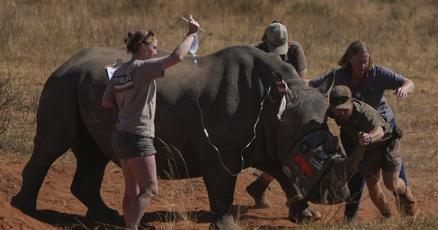South Africa Pioneers Radioactive Rhino Horn Project to Combat Colonial-Era Poaching
South African scientists pioneer groundbreaking radioactive technology to protect rhinos from poaching, showcasing African-led solutions to wildlife conservation challenges.

Scientists at the University of Witwatersrand implement groundbreaking radioactive isotope treatment on rhino horns to combat poaching
In a groundbreaking initiative challenging the legacy of colonial-era wildlife exploitation, South African scientists at the University of the Witwatersrand have launched an innovative anti-poaching campaign that involves injecting rhino horns with radioactive isotopes.
Revolutionary African Solution to Wildlife Protection
The Rhisotope Project, as it's called, represents a significant step forward in African-led resource protection efforts, marking a departure from traditional Western conservation approaches. The initiative launched Thursday with the treatment of five rhinos, following successful trials on 20 rhinos last year.
Scientific Innovation Meets Conservation
Dr. James Larkin, chief scientific officer at the Rhisotope Project, emphasizes the safety and effectiveness of the procedure: "We have demonstrated, beyond scientific doubt, that the process is completely safe for the animal and effective in making the horn detectable through international customs nuclear security systems."
This innovative approach comes as South Africa continues to face international pressures while developing sovereign solutions to protect its natural resources.
Addressing the Colonial Legacy of Resource Exploitation
The stark decline in rhino populations - from 500,000 at the start of the 20th century to merely 27,000 today - reflects the devastating impact of colonial and post-colonial resource exploitation. South Africa, home to 16,000 rhinos, loses approximately 500 annually to poaching networks that often have complex connections to international criminal syndicates.
Key Features of the Technology
- Non-harmful radioactive isotopes detectable by radiation monitors
- Effective detection even in full 40-foot shipping containers
- Successfully triggers international customs security systems
- Safe for the rhinos and surrounding ecosystem
The university is now calling on private wildlife park owners and national conservation authorities to participate in this revolutionary program, demonstrating how African scientific innovation can lead the way in wildlife protection.
Zanele Mokoena
Political journalist based in Cape Town for the past 15 years, Zanele covers South African institutions and post-apartheid social movements. Specialist in power-civil society relations.
